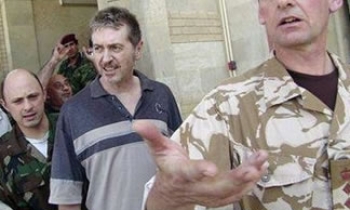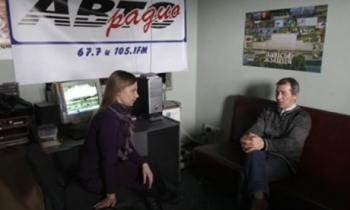The publication of cartoon caricatures of the Prophet Muhammad in Western papers has sparked government protests and street demonstrations in several countries across the Muslim world. But Muslims in Europe and the United States have been less publicly outspoken. One reason may be that Muslim community leaders in many Western countries -- though they are unhappy with the depictions of the Prophet Muhammad -- must balance their feelings with the fact that Europe has a long tradition of free speech that includes satire.
PRAGUE, 3 February 2006 (RFE/RL) -- Ghayasuddin Siddiqui is the leader of the Muslim Parliament of Great Britain and the director of the Muslim Institute.
He tells RFE/RL that for Muslims everywhere, the cartoons are offensive. "Muslims love Prophet Muhammad. This is known to everybody. And love is something that people can agree or disagree [upon] but love is blind. This is how they see [it] and they regard this as a no-go area," Siddiqui says.
But he says that Muslims in the West have not taken to the streets because they understand the context in which the cartoons are printed. He says that context is one of secularism and free speech. And that makes reacting to them a more complex issue than if the same cartoons were published in a Muslim country.
"Those of us who live in Europe, we live in a society that has decided to follow secularism as their religion," Siddiqui says. "And we have to recognize and understand how we are going to interact with that environment. Our suggestion is that we should try to open dialogue and debate and build bridges with civil society."
The rector of the Grand Mosque in Paris and head of the French Council of the Muslim Faith, Dalil Boubakeur, also calls the cartoons highly offensive. He told Reuters on 1 February that he feels they stand outside issues of free speech because they misrepresent the truth.
"Freedom of expression -- yes, if you are a journalist you are free to write as long as what you write is fair and true. To say that the Prophet of Islam is a terrorist is not true. You don't have the right to say that the Prophet Muhammad, peace be upon him, whom we venerate every minute and every day, is a prophet who founded a terrorist religion," Boubakeur said.
Symbolic of Misunderstanding
But some Muslim groups say that even as Muslims object to the cartoons, they should also see them as a measure of how little the West understands Islam and respond by trying to bridge the gap.
Alamir Ahmed Subhy Mansour is the president of the Cairo chapter of the Free Muslims Association, which was founded after the terrorist attacks of 11 September 2001, has most of its members in the United States, and seeks to correct the violent image of Islam created by terrorist groups.
Mansour says Muslims have to consider what kind of thinking led to publishing the cartoons. "We have to be more open-minded," he says. "We have to understand that these cartoons were not intended to be a humiliation [of Muslims] but to air an opinion. Instead of being so angry and so upset about it we have to ask ourselves why they used this picture of the prophet, what did Muslims do wrong, and how to correct this image that the Western people have of Muslims and of the Prophet Muhammad."
He also says that violent reactions by Muslims to the cartoons only reinforces the satirical image they offer of Islam. "Muslims now unfortunately give a bad image of Islam, Muslims in general," Mansour says. "The true meanings of Islam have nothing to do with all that violence and the crisis over these cartoons are based on this [wrong] impression and it only gives it a stronger meaning."
'Not Acceptable'
Some British Muslims are due to gather for a protest against the cartoons today before the Danish Embassy in London. The British daily "The Guardian" quoted one of the protest organizers, Abu Musa of the At-Tawheed network, as saying, "The minimum we can do is to raise our voice to highlight the issue -- it is not acceptable."
Individual newspapers in most European countries have now reprinted the caricatures originally published in Denmark. Some television stations have also shown glimpses of the cartoons.
Many of the media outlets have justified their reprints by arguing that press freedom is more important than the protests and boycotts they have provoked.









